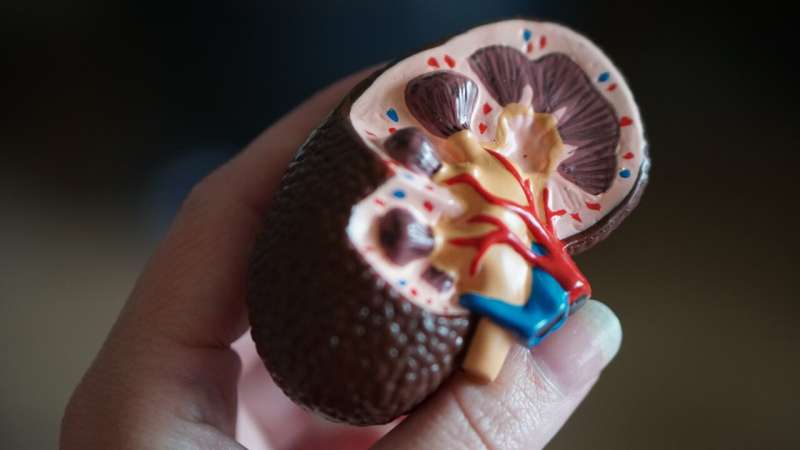This article has been reviewed according to Science X's editorial process and policies. Editors have highlighted the following attributes while ensuring the content's credibility:
fact-checked
peer-reviewed publication
trusted source
proofread
Brief dialysis may be best for some kidney patients

Patients with acute kidney injury requiring outpatient dialysis after hospital discharge receive the same care as those with the more common end-stage kidney disease, according to a study led by UC San Francisco.
But while patients with the latter diagnosis—typically caused by long-standing hypertension or diabetes—must remain on lifelong dialysis or receive a new kidney, some patients on dialysis for acute kidney injury have the potential to recover, the researchers reported in their study in the Journal of the American Society of Nephrology.
"For those who have the potential to recover, remaining on dialysis may place them at unnecessary risk for heart disease, infection, organ damage and death," said first author Ian E. McCoy, MD, of the UCSF Division of Nephrology.
Less than a quarter of patients in a typical midsize dialysis centers have acute kidney injury. It may result from acute infection or shock, causing reduced blood flow to the kidneys, as well as major surgeries and chemotherapy agents that are toxic to the kidneys.
Patients receive similar treatment, testing, despite different recovery potential
In the study, researchers tracked data from 1,754 patients with acute kidney injury and 6,197 patients with end-stage kidney disease at outpatient dialysis centers. Although lab tests suggested acute kidney injury patients needed less dialysis, the two groups were treated largely the same. Both were started on thrice-weekly dialysis, and the large majority of patients in both groups were not tested for kidney functioning in the first month of treatment.
Among the acute kidney injury patients, 10% died during the three-month study period—most likely from the conditions that prompted dialysis, according to the researchers. Of the 41% of patients who recovered kidney function, approximately three-quarters had discontinued dialysis without any changes to the dose, frequency and duration. This suggests that these patients could have been weaned at an earlier point, the researchers noted.
"More research is needed on safe weaning strategies," said McCoy. "If a patient is weaned off too quickly, they could become short of breath, or they could develop electrolyte abnormalities that can increase the risk of dangerous heart rhythms.
"On the other hand, continuing dialysis unnecessarily is also risky, since patients experience high rates of heart disease, infection and mortality," he said.
For kidney specialists taking care of acute kidney injury patients and dialysis providers operating the outpatient centers, there are powerful disincentives to wean patients off dialysis, McCoy said.
"Deprescribing benefits the health care system, but not the dialysis provider, who will have an empty chair that is not easy to fill. At the same time, kidney specialists lose a multidisciplinary support team of nurses, dietitians and social workers when a patient recovers enough to discontinue dialysis.
"Kidney specialists are also paid less by insurance for non-dialysis care even though managing a patient with borderline kidney function is more time consuming and riskier than managing them on thrice-weekly dialysis. For these reasons, the default path of least resistance may be to continue dialysis."
Three months of dialysis may mean indefinite dialysis
Approximately half of the patients neither died nor discontinued dialysis by the end of the study. For them, the future looked uncertain, said Chi-yuan Hsu, MD, senior author and chief of the UCSF Division of Nephrology. "After about three months of dialysis, they almost always are treated like they will remain on dialysis indefinitely," he said.
"Doctors don't seem to pay as much attention as they can to monitoring for early, subtle signs of recovery. When someone's kidney function is at 30%, it's obvious that they do not need dialysis, but when it's subtle—10% to 15%—it requires skill, attention, careful discussion with the patient and willingness to assume some risk in the weaning process," said Hsu. "We suspect many doctors stop dialysis only when the signs are blindingly obvious."
The worst-case scenario is a patient who may have recovered just enough kidney function to wean but has remained on dialysis. Drops in blood pressure with repeated dialysis may further inflict damage to the vulnerable kidneys driving kidney function below the threshold believed to be required for weaning, said McCoy. "The patient may now be facing dialysis for the rest of their life or end up needing a transplant, if they are well enough to be a candidate."
More information: Ian E. McCoy et al, Journal of the American Society of Nephrology (2023).


















